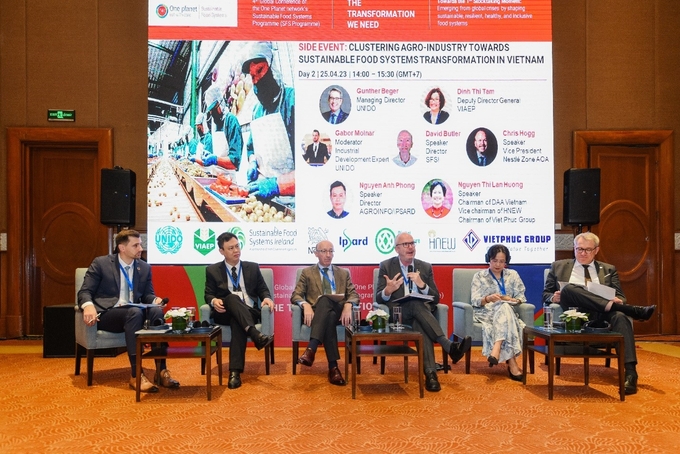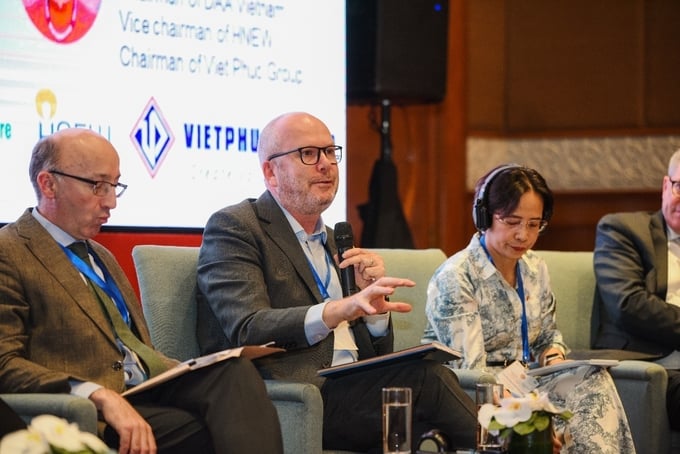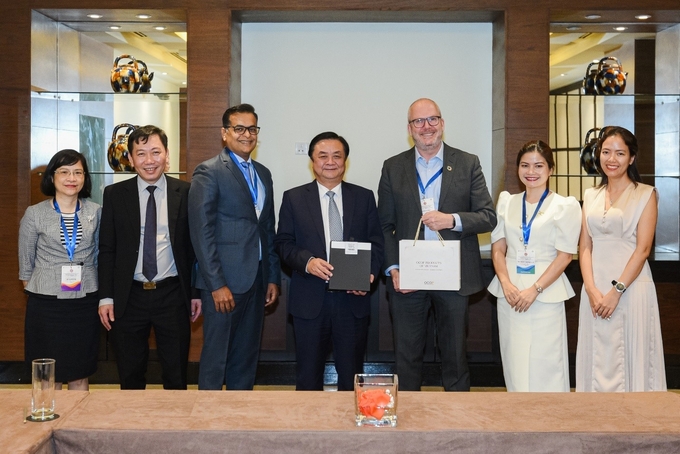May 21, 2025 | 06:54 GMT +7
May 21, 2025 | 06:54 GMT +7
Hotline: 0913.378.918
May 21, 2025 | 06:54 GMT +7
Hotline: 0913.378.918

The discussion session "Clustering Agro-Industry Towards Sustainable Food System Transformation in Vietnam" was organized by the Ministry of Agriculture and Rural Development and UNIDO. Photo: Tung Dinh.
On April 25, the Ministry of Agriculture and Rural Development coordinated with the United Nations Industrial Development Organization (UNIDO) to organize a discussion session on "Clustering Agro-Industry Towards Sustainable Food System Transformation in Vietnam." This is a side event of the 4th Global Conference on Sustainable Food Systems, with the participation of representatives of UNIDO, Nestlé, Ireland Sustainable Food System, etc.
Realizing Vietnam's potential to become a regional center of food system transformation requires a clear transformation to enhance production capacity while accelerating the availability of agricultural economic clusters to promote the development of enterprises in Vietnam.
With the world's premium markets moving towards sustainable standards, food system transformation and a more efficient agricultural sector can help Vietnamese businesses improve their competitiveness in the global supply chain.
In response to that goal, the discussion session "Clustering Agro-Industry Towards Sustainable Food System Transformation in Vietnam," with the participation of many public and private organizations, created a forum to discuss Vietnam’s development of agricultural economic clusters. Through this event, the parties shared lessons learned, thereby identifying improved production methods and finding viable partners to jointly transform the food system.
At the forum, Mr. Gabor Molnar, UNIDO's associate industrial development expert, said that the formation of economic clusters requires not only the participation of businesses but also the participation of the whole ecosystem with businesses and service industries, supporting the business community to cooperate with the government.
An economic cluster is a geographical concentration of interconnected businesses and organizations that share the same opportunities and challenges. Currently, local and global clusters are facing the same challenges, including climate change, environmental regulatory changes, socio-economic crises, etc.
In order to develop an effective agricultural economic cluster, it is necessary to involve many parties, from suppliers of raw materials and agricultural equipment to farms, manufacturing, and exporting enterprises, to connect with domestic and international buyers.

Mr. Chris Hogg shared about Nestlé's efforts to support farmers in countries transforming to a regenerative food system, including Vietnam. Photo: Tung Dinh.
At the event, Mr. Chris Hogg, Vice President of Sustainable Development and Communications for Asia, Oceania, and Africa at Nestlé Group, said Nestlé is supporting farmers in countries transforming to a regenerative food system, including Vietnam, in order to protect and contribute to environmental restoration, improve farmers' livelihoods, and improve the quality of life of communities and consumers.
Through the implementation in many countries, the Nestlé representative said that the biggest challenge is the farmers’ trust and how they can apply the new farming model because the methods of practicing sustainable agriculture can go against what their forefathers taught and passed on.
"In the transition period, we need to have programs to give farmers the technology and the methods. For transformation to be truly effective, not just a slogan, we need to place farmers and farm workers at the center when designing programs, and we need to make sure these programs bring benefits for communities and the planet. It is also noticed that we can't do it alone, but we have to aim for sustainable agriculture with many different partners," said Mr. Chris Hogg.
Currently, to promote the sustainable food system transformation, Nestlé implements many programs to promote sustainable agriculture in farming and cultivation. Nestlé commits that by 2030, 50% of the main ingredients in the Group's products must come from sustainable agricultural sources.
For the coffee sector, Nestlé recently announced the program “Nescafé Plan 2030” to support the transition to sustainable agriculture and contribute to realizing Nestlé's commitment to net zero emissions (Net Zero) by 2050. Vietnam is one of the seven main markets where Nestlé is implementing Nescafé Plan 2030.

On the sidelines of the event, Minister of Agriculture and Rural Development Le Minh Hoan met and discussed with Mr. Chris Hogg. Photo: Tung Dinh.
Also on April 25, Mr. Chris Hogg had a meeting and exchanged some information with Mr. Le Minh Hoan, Minister of Agriculture and Rural Development of Vietnam.
At the meeting, Minister Le Minh Hoan welcomed the programs and projects that Nestlé is implementing in Vietnam. Through this event, the head of Vietnam's agricultural industry hopes that in the near future, Nestlé will further promote circular production models, integrating multi-values in the coffee industry.
Accordingly, the wish of Minister Le Minh Hoan is that none of the coffee industry’s by-products are wasted but will be used for different purposes, creating more products. This not only helps to improve the environment and reduce waste but also contributes to increasing income for farmers and workers in the coffee industry.
For his part, Mr. Chris Hogg said Nestlé had net-zero circular production models. Farmers' livelihoods are also a big concern for the group.
According to Mr. Chris Hogg, although he runs a coffee business, he wants Vietnamese farmers not to monoculture this plant but to be able to properly intercrop other plants in the coffee garden. That not only helps them earn more income but also improves the quality of the land, contributing to environmental protection.
Translated by Huyen Vu Thu

(VAN) Japan's grant aid project contributes to capacity building, promoting organic agricultural production, and fostering sustainable community development in Dong Thap province.

(VAN) For years, the CRISPR-Cas9 genome technology has been reshaping genetic engineering, a precision tool to transform everything from agriculture to medicine.

(VAN) Vietnam aims to become a 'leader' in the region in the capacity and managing effectively soil health and crop nutrition.
![Reducing emissions from rice fields: [Part 1] Farming clean rice together](https://t.ex-cdn.com/nongnghiepmoitruong.vn/608w/files/news/2025/05/05/z6509661417740_a647202949c539012a959e841c03e1d3-nongnghiep-143611.jpg)
(VAN) Growing clean rice helps reduce environmental pollution while increasing income, allowing farmers to feel secure in production and remain committed to their fields for the long term.
/2025/05/19/5136-1-144800_230.jpg)
(VAN) The Nghe An Provincial People's Committee has just approved the list of beneficiaries eligible for revenue from the Emission Reductions Payment Agreement (ERPA) in the North Central region for the year 2025.

(VAN) 14 out of 35 domesticated elephants in Dak Lak province have had their living conditions improved, with 11 of them currently participating in the non-riding elephant tourism model.

(VAN) Muong Nhe Nature Reserve hopes that being upgraded to a national park will lay the foundation for forest protection efforts to be carried out in a systematic, modern, and sustainable manner.